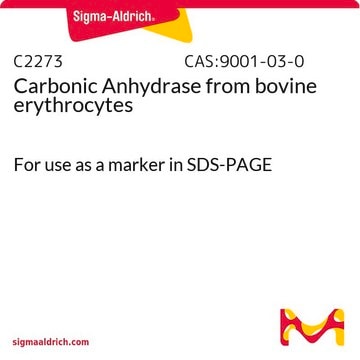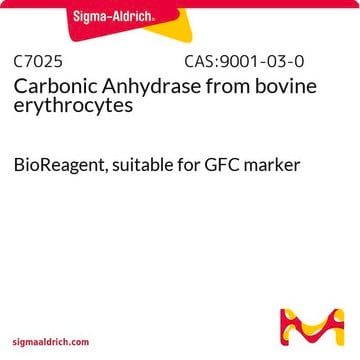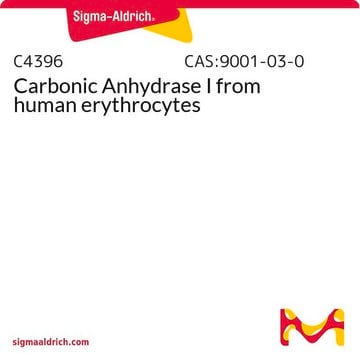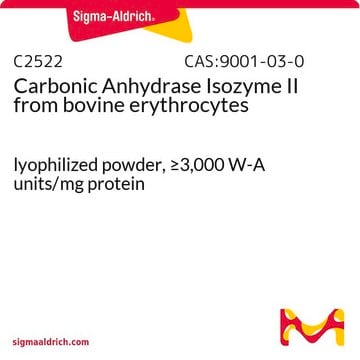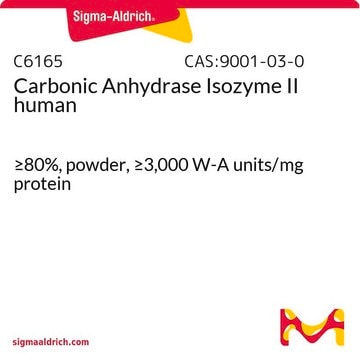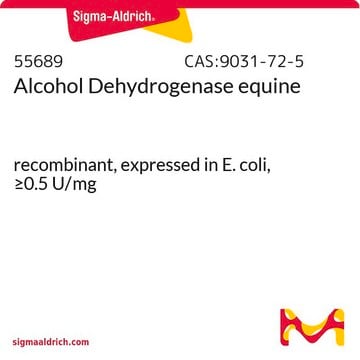C5024
Carbonic Anhydrase from bovine erythrocytes
non-denaturing PAGE marker
Synonym(s):
Carbonate Dehydratase, Carbonate Hydrolyase
Sign Into View Organizational & Contract Pricing
All Photos(1)
About This Item
Recommended Products
Quality Level
form
lyophilized powder
mol wt
~29 kDa
suitability
suitable for marker for electrophoresis (non-denaturing PAGE)
storage temp.
−20°C
Looking for similar products? Visit Product Comparison Guide
Application
This product is used as a marker to determine the molecular mass of an unknown protein in non-denaturing electrophoresis systems. In such systems, proteins often retain their biological activity, thus allowing in-gel detection using specific substrate stains. This technique also facilitates the recovery of the active protein. The product yields 3 bands.
Reconstitution
0.9-1.4 mg/mL after reconstitution with 1 mL of water
Signal Word
Danger
Hazard Statements
Precautionary Statements
Hazard Classifications
Resp. Sens. 1
Storage Class Code
11 - Combustible Solids
WGK
WGK 3
Flash Point(F)
Not applicable
Flash Point(C)
Not applicable
Personal Protective Equipment
dust mask type N95 (US), Eyeshields, Gloves
Certificates of Analysis (COA)
Search for Certificates of Analysis (COA) by entering the products Lot/Batch Number. Lot and Batch Numbers can be found on a product’s label following the words ‘Lot’ or ‘Batch’.
Already Own This Product?
Find documentation for the products that you have recently purchased in the Document Library.
Customers Also Viewed
Wolfgang Maret
Advances in nutrition (Bethesda, Md.), 4(1), 82-91 (2013-01-16)
The nutritional essentiality of zinc for the growth of living organisms had been recognized long before zinc biochemistry began with the discovery of zinc in carbonic anhydrase in 1939. Painstaking analytical work then demonstrated the presence of zinc as a
Laurie C Hofmann et al.
Journal of experimental botany, 64(4), 899-908 (2013-01-15)
The concentration of CO(2) in global surface ocean waters is increasing due to rising atmospheric CO(2) emissions, resulting in lower pH and a lower saturation state of carbonate ions. Such changes in seawater chemistry are expected to impact calcification in
Romualdo Talento et al.
Ultrastructural pathology, 37(1), 70-76 (2013-02-07)
Despite progress in the classification of renal cell carcinomas (RCC), a subset of these carcinomas remains unclassified (RCC-U). Patients with RCC-U usually present at a late stage and have a poor prognosis. Several studies have attempted to extract new classifications
Frédéric D Birkhäuser et al.
Journal of immunotherapy (Hagerstown, Md. : 1997), 36(2), 102-111 (2013-02-05)
The dendritic cell vaccine DC-Ad-GM·CAIX is an active, specific immunotherapy with the potential of providing a safe and effective therapy against renal cell carcinoma (RCC). Using immunocompetent Balb/c mouse models we tested the efficacy and mechanism of the vaccine to
Peter Burghout et al.
Journal of bacteriology, 195(7), 1573-1582 (2013-01-29)
Although carbon dioxide (CO2) is known to be essential for Streptococcus pneumoniae growth, it is poorly understood how this respiratory tract pathogen adapts to the large changes in environmental CO2 levels it encounters during transmission, host colonization, and disease. To
Our team of scientists has experience in all areas of research including Life Science, Material Science, Chemical Synthesis, Chromatography, Analytical and many others.
Contact Technical Service
